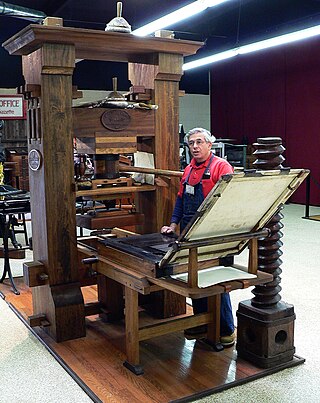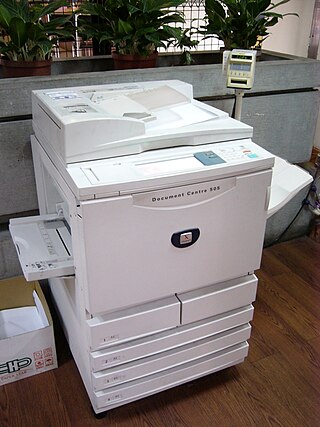
A book is a medium for recording information in the form of writing or images, typically composed of many pages bound together and protected by a cover. The technical term for this physical arrangement is codex. In the history of hand-held physical supports for extended written compositions or records, the codex replaces its predecessor, the scroll. A single sheet in a codex is a leaf and each side of a leaf is a page.

A manuscript was, traditionally, any document written by hand or typewritten, as opposed to mechanically printed or reproduced in some indirect or automated way. More recently, the term has come to be understood to further include any written, typed, or word-processed copy of an author's work, as distinguished from the rendition as a printed version of the same.

Textual criticism is a branch of textual scholarship, philology, and literary criticism that is concerned with the identification of textual variants, or different versions, of either manuscripts (mss) or of printed books. Such texts may range in dates from the earliest writing in cuneiform, impressed on clay, for example, to multiple unpublished versions of a 21st-century author's work. Historically, scribes who were paid to copy documents may have been literate, but many were simply copyists, mimicking the shapes of letters without necessarily understanding what they meant. This means that unintentional alterations were common when copying manuscripts by hand. Intentional alterations may have been made as well, for example, the censoring of printed work for political, religious or cultural reasons.

Print on demand (POD) is a printing technology and business process in which book copies are not printed until the company receives an order, allowing prints of single or small quantities. While other industries established the build to order business model, "print on demand" could only develop after the beginning of digital printing, because it was not economical to print single copies using traditional printing technology such as letterpress and offset printing.

Bibliography, as a discipline, is traditionally the academic study of books as physical, cultural objects; in this sense, it is also known as bibliology. English author and bibliographer John Carter describes bibliography as a word having two senses: one, a list of books for further study or of works consulted by an author ; the other one, applicable for collectors, is "the study of books as physical objects" and "the systematic description of books as objects".

To publish is to make content available to the general public. While specific use of the term may vary among countries, it is usually applied to text, images, or other audio-visual content, including paper. Publication means the act of publishing, and also any copies issued for public distribution.

In publishing, a colophon is a brief statement containing information about the publication of a book such as an "imprint". A colophon may include the device (logo) of a printer or publisher. Colophons are traditionally printed at the ends of books, but sometimes the same information appears elsewhere and many modern (post-1800) books bear this information on the title page or on the verso of the title-leaf, which is sometimes called a "biblio-page" or the "copyright-page".

The Gutenberg Bible was the earliest major book printed using mass-produced movable metal type in Europe. It marked the start of the "Gutenberg Revolution" and the age of printed books in the West. The book is valued and revered for its high aesthetic and artistic qualities as well as its historical significance. It is an edition of the Latin Vulgate printed in the 1450s by Johannes Gutenberg in Mainz, in present-day Germany. Forty-nine copies have survived. They are thought to be among the world's most valuable books, although no complete copy has been sold since 1978. In March 1455, the future Pope Pius II wrote that he had seen pages from the Gutenberg Bible displayed in Frankfurt to promote the edition, and that either 158 or 180 copies had been printed.
Copy editing is the process of revising written material (copy) to improve readability and fitness, as well as ensuring that a text is free of grammatical and factual errors. The Chicago Manual of Style states that manuscript editing encompasses "simple mechanical corrections through sentence-level interventions to substantial remedial work on literary style and clarity, disorganized passages, baggy prose, muddled tables and figures, and the like ". In the context of print publication, copy editing is done before typesetting and again before proofreading. Outside traditional book and journal publishing, the term copy editing is used more broadly, and is sometimes referred to as proofreading, or the term copy editing sometimes includes additional tasks.
The bibliographical definition of an edition is all copies of a book printed from substantially the same setting of type, including all minor typographical variants.

The Ballad of Reading Gaol is a poem by Oscar Wilde, written in exile in Berneval-le-Grand, after his release from Reading Gaol on 19 May 1897. Wilde had been incarcerated in Reading after being convicted of gross indecency with other men in 1895 and sentenced to two years' hard labour in prison.

The history of books became an acknowledged academic discipline in the 1980s. Contributors to the discipline include specialists from the fields of textual scholarship, codicology, bibliography, philology, palaeography, art history, social history and cultural history. Its key purpose is to demonstrate that the book as an object, not just the text contained within it, is a conduit of interaction between readers and words.

In graphic design, page layout is the arrangement of visual elements on a page. It generally involves organizational principles of composition to achieve specific communication objectives.

The Hinman collator, an early optical collator, was an opto-mechanical device for comparing pairs of documents for differences in the text. Documents that appeared similar were said to “collate”. The collator resulted in rapid advances in the study of literary works.

In library and information science, cataloging (US) or cataloguing (UK) is the process of creating metadata representing information resources, such as books, sound recordings, moving images, etc. Cataloging provides information such as author's names, titles, and subject terms that describe resources, typically through the creation of bibliographic records. The records serve as surrogates for the stored information resources. Since the 1970s these metadata are in machine-readable form and are indexed by information retrieval tools, such as bibliographic databases or search engines. While typically the cataloging process results in the production of library catalogs, it also produces other types of discovery tools for documents and collections.

The Licensing of the Press Act 1662 was an Act of the Parliament of England with the long title "An Act for preventing the frequent Abuses in printing seditious treasonable and unlicensed Books and Pamphlets and for regulating of Printing and Printing Presses". Having expired in 1695, it was officially repealed by the Statute Law Revision Act 1863, which repealed a large set of superseded acts.

A photocopier is a machine that makes copies of documents and other visual images onto paper or plastic film quickly and cheaply. Most modern photocopiers use a technology called xerography, a dry process that uses electrostatic charges on a light-sensitive photoreceptor to first attract and then transfer toner particles onto paper in the form of an image. The toner is then fused onto the paper using heat, pressure, or a combination of both. Copiers can also use other technologies, such as inkjet, but xerography is standard for office copying.

The following outline is provided as an overview of and topical guide to books:

Sophistication of books is the practice of making a book complete by replacing missing leaves with leaves from another copy. In some cases this is done with the intent to deceive or mislead, modifying and offering books for sale in an attempt to sell them for a higher value. When offered for sale, a book's description should be clear and unambiguous, and indicate exactly and in detail any changes that have been made to the book.














